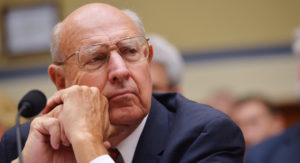by WorldTribune Staff, June 27, 2016
A former State Department official who advocated for the Iran nuclear accord failed to disclose his ties to Boeing and the aircraft maker’s ultimate interest in the deal’s success.
Thomas Pickering, a former U.S. ambassador to Israel, was one of the most persistent advocates for the nuclear deal and the sanctions relief that would follow. Pickering pushed for the deal in testimony before Congress and in several opinion pieces he wrote, including many for The New York Times.

Boeing recently confirmed that Iran Air, the Islamic Republic’s national carrier, plans to buy 80 of its planes for $17.6 billion and lease another 30. Iran was eager to seal the Boeing component of the deal because the Islamic Republic’s civilian airplanes are outmoded and have suffered multiple crashes in recent years.
“Without the Iran deal that Mr. Pickering helped to get passed, the transaction would certainly have been prohibited by American economic sanctions on Iran,” Ira Stoll wrote for The Algemeiner.
Pickering confirmed via an email to the Daily Beast that he was on staff at Boeing from 2001 to 2006 and has been a paid consultant for them ever since.
Stoll also said the revelation about Pickering “creates a scandal for The New York Times,” as the newspaper had mentioned the former ambassador in at least 29 pieces in the past decade, according to an Algemeiner analysis of the Times archives.
“In at least 14 different news articles, some of the newspaper’s veteran diplomatic and national security reporters — David Sanger, Mark Landler, Somini Sengupta — called Mr. Pickering for quotations and context and opinions over and over again, without ever even once disclosing to Times readers that he was getting paid by a company that was poised to sell tens of billions of dollars worth of aircraft to Iran if a sanctions-lifting deal went through,” Stoll wrote.
“The Times op-ed and editorial section’s record relating to Mr. Pickering is just as embarrassingly bad. Times columnist Richard Cohen wrote at least three columns at least partly about Mr. Pickering without ever once disclosing the Boeing work. Mr. Pickering himself wrote an op-ed for the Times, an op-ed for the Times’ International Herald Tribune, and a letter to the editor of the Times. Not a single one of those three pieces disclosed the Boeing work; the op-ed’s thumbnail biography told readers of the Times merely that “Thomas R. Pickering, an under secretary of state for political affairs in the Clinton administration, served as United States ambassador to Russia, Israel, Jordan and the United Nations.”
Stoll continued: “A public editor might ask whether Times editors or reporters bothered to ask Mr. Pickering if he had any paid consulting work for clients interested in business with Iran. What did Mr. Pickering tell the Times if the paper did ask? If the Times didn’t ask, why did it fail?
“Is the usual journalistic skepticism suspended when a source or contributing opinion writer is pushing a deal that would give billions to a terrorist enemy of Israel? The whole situation is an embarrassment to the Times. But to be embarrassed requires a sense of shame, which, alas, it isn’t clear that the Times has on these topics.”
